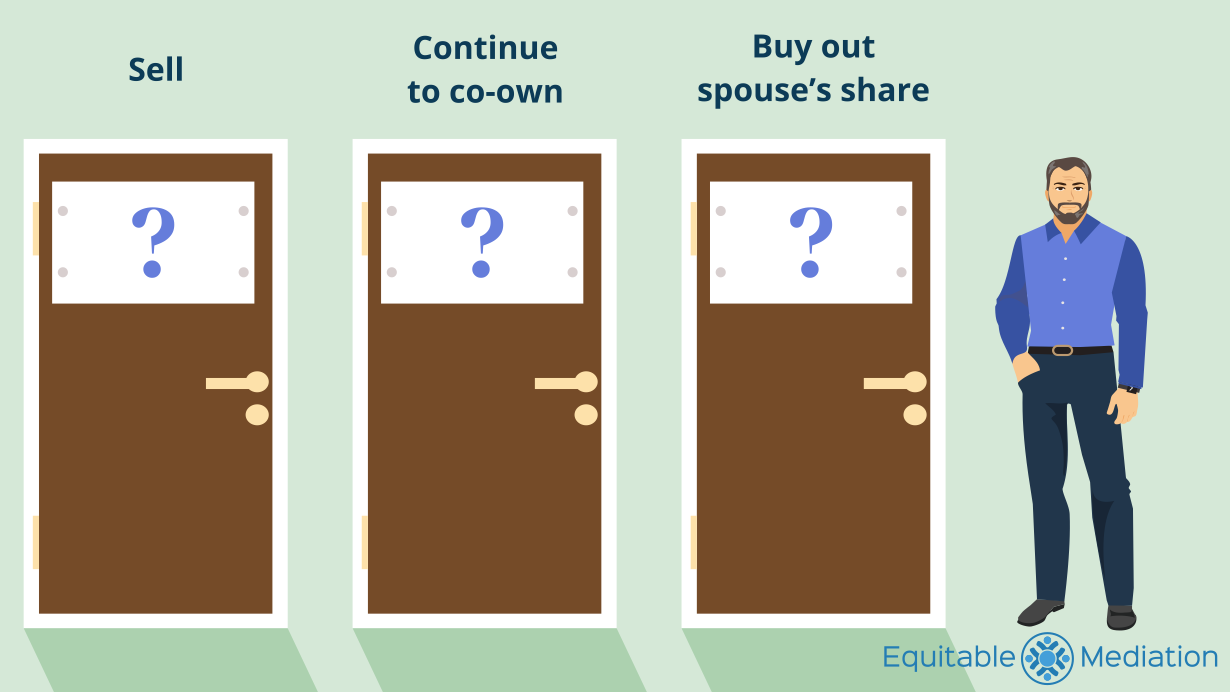As experts in divorce for business owners, we understand the sacrifices you and your family made to get where you are. In many cases taking years, if not decades, to build a business or professional practice you can be proud of.
When you own a business, going through a divorce often raises many questions:
- How do you determine what it’s actually worth?
- What’s the best way to divide a business in a divorce?
- How do you define what percentage is considered marital property?
- And how do you protect your business and get the best divorce outcome with a business involved?
Now that you’re ending your marriage, you want to make sure your agreement balances both your interests while acknowledging the scheduling challenges, compensation, and income complexities unique to a self-employed entrepreneurial lifestyle. And at the same time, prevent outsiders from destroying everything you’ve worked so hard to build.
Let’s dive deeper into each of these questions so you can approach your own divorce case with clarity and confidence.
Note: As we provide mediation services in the community property states of Washington and California, and the equitable distribution states of Illinois, New York, New Jersey, and Pennsylvania, we’ve successfully helped divorcing couples reach agreement using both property division approaches.
There are a few things you need to understand about the challenges of divorce with a business involved:

- There’s more than one business valuation method and the various methods can produce wildly different results;
- The best method to divide a business in a divorce isn’t the same for everyone;
- Determining what percentage of a private business is considered marital assets can also be difficult, especially when dividing assets during a divorce;
- Parenting time, child support, and spousal support can all be unwittingly impacted in a business owner divorce;
- Divorce with a business involved has less to do with laws and more to do with money and negotiation;
- There is more than meets the eye on this topic and this issue is much too complex for you and your spouse to try to resolve on your own.
Business valuation in a divorce

There’s more than one method for valuing businesses and the various methods can produce wildly different results.
It’s a common misconception when getting a business valuation for divorce purposes, that valuators will produce a report with a single value. But that’s rarely the case.
At a high level, the three methods are:
- The cost approach which is based on the fair market value of a business’s net assets;
- The market approach which values a business based on what other similar businesses have sold for in the recent past;
- The income approach which uses projected earnings to derive a present value for the business.
Depending on the type of business you have, one approach may be more suitable than another. But each of these valuations can produce wildly different results. In some of the cases I’ve mediated, one of these methods showed a positive value, while another showed a negative value.
Let’s say you’re one of the 28% of Americans who is a small business owner and you want to sell your business ownership – and in this example, you’re NOT also getting a divorce. Naturally, you’d want to use the method that resulted in the highest value. And your spouse would want to use that valuation method, too.
But since you are getting a divorce, and your business will become a marital asset (subject to community property division, or equitable distribution you might want to use the valuation method that resulted in the lowest business’ value.
You and your spouse’s interest are now immediately at odds. And if each of you has a divorce attorney representing you, naturally, they’re going to argue for whichever outcome is best for their client. Which can turn most businesses from an asset into a liability in the blink of an eye.
Do you own a business? Or are you the business?
Let’s say you’re a financial advisor and run a small investment advisory firm. Your business is a success because of the relationships you built with clients over time – as well as intangible assets such as the licenses you have that allow you to run such a operation.
Now you need a business valuation for divorce. But the value is based on your efforts, personal goodwill, and relationships.
So what happens if:
- You take all your clients with you, or
- You’re the only person that brings in income, or
- You’re the only one licensed to perform the service,
What value does the business really have? Without you, maybe there is no business. And in turn, no value. This is what I call the “key man problem.”
Did you reinvest in the business in lieu of taking a salary?
It’s not uncommon for the self-employed to invest everything they have into growing their business. And that might even include not taking a salary.
Maybe you thought, “My spouse has a good job, so I’ll rely on him/her to pay the bills and cover us financially – and I’ll forego a salary and instead, reinvest any profits into my business.” So that’s what you did. And as a result, your business grew more quickly than it would have had you been taking a salary.
Now there are a few problems:
First, had you drawn a salary, there would have been less money available to reinvest. And as a result, the growth rate would have been slower. Leading to a lower valuation at the time of your divorce.
Second, at the time of your divorce, because your business value would likely be inflated, you may have had to offer your soon-to-be ex more of your marital property / or other assets to come to an agreement you both found fair.
Third, because you’ll no longer have your spouse to support you after you’re divorced, you’ll have to take a salary. Which leaves less cash flow available to reinvest into growing your operations.
The best method to divide a business in a divorce isn’t the same for everyone.

Just as there are various methods to value one, there are also numerous options for how to divide one. And the option you choose is entirely dependent on your unique situation.
You could sell it.
On the surface, this might seem to be the easiest way to go. Whatever proceeds you receive from the sale you and your spouse could divide as you see fit. But selling your business can come with challenges.
For example, what will you do to earn money after you sell? Especially if you include your intellectual property, as is common in non-service businesses.
This will be important for not only covering your own living expenses but also if you are required to make child support or alimony payments as a result of your divorce.
You could continue to co-own it.
Another way to “divide” a business may be to not divide it at all. If you and your spouse are getting a divorce when you own a business together, and you each play an active role in operating it, you may wish to leave things as-is.
On the surface, this may seem like a good idea as it eliminates the need for a tangible property valuation at the time of your divorce. And removes this asset from your divorce negotiations. It also allows each of you to enjoy the “perks” of the family business, maintain your current salaries, and share in the net profits of the business.
But… you’re getting a divorce owning a business together could be difficult, or impossible. Will you and your ex still be able to effectively communicate as both a divorcing couple and co-owners, and agree on a future direction for the company knowing that your financial and lifestyle goals may no longer be aligned?
You could buy out your spouse’s business interests.
Buying your spouse out may seem simple enough – you would get to keep the intangible and tangible assets and they would get to keep other comparable tangible and intangible assets or marital property. But in order to provide a basis for the negotiation of the buyout amount, a valuation will be required. And it’s entirely possible that the amount could be higher than what you could actually sell it for on the open market.
Since you are not selling the business on the open market, you really don’t (and won’t) know what the true sales price (and net proceeds) would be. But the problem is that your ex may now expect you to buy them out using the valuation amount. And given your experience in your profession, you may not think that value is realistic.
Determining what percentage of a private business are marital assets / marital property vs. separate assets / separate property can be difficult.

- Is the business a marital asset or a separate asset?
- Did you start your business during the marriage or prior to the marriage?
- If you started your business prior to the marriage, do you know what its value was at the time you got married? Did you have your business valued at that time?
- Did you invest any marital funds into the business? Or was it all done separately, apart from the marital estate?
- Did the business grow during the time you were married? Is that portion marital and therefore subject to division?
Even if on the off chance you had a prenuptial agreement or postnuptial agreement in place outlining each spouse’s business interest in the event of a divorce, a good family lawyer could likely rip it to shreds.
Did you start the business, then after you got married, your spouse started working in it?
Some couples decide to start a business after they get married, use marital funds to launch in it, and work in it together. In that case, there’s almost no question 100% of the business is considered marital property as both spouses contributed. But let’s say you started your business 5 years before you got married. Then, after 7 years of marriage, you decide your business has grown to the point where it could support another employee. So you say to your spouse, “Congratulations! You’re hired!” and they join the business full-time.
After 4 years of working together, the pressure proves to be too much. Your spouse quits, asks for a divorce, and expects to get their fair share out of the business when it comes time to divide your property. The question now on the table is do you know what share of your business relationship is marital, pre-marital, or even non-marital (that is – the time only you worked in it even though you were married)?
Is it based on:
- The number of years each of you worked in the business?
- The revenue the business generated?
- The value you each provided to the operations and/or bottom line?
- All of the above?
If this is starting to sound like one of those math word problems that gave you nightmares in school, that’s because it is. And there’s no one size fits all answer to the question.
Or is your spouse an owner “in name only?”
Some businesses assign an ownership interest to each spouse, with one spouse being an owner “in name only” (INO) – meaning they don’t work in the business on a day-to-day basis. What happens then?
For example, in the case of a divorce and LLC business, does the non owner spouse get a share based on what is outlined in the membership agreement? Or what if your spouse has no ownership at all? Can they get a share of additional marital property or other assets then?
What if they performed other tasks during the marriage such as childcare, or held down the fort at home while you were off building the business? Even if the you consider it an individual asset
Without your spouse caring for the kids and/or managing the house, you may not have been able to grow your business into the successful entity it is today. So while they may not have worked directly on or in your business, they may certainly have had a hand in its success. And the question of whether or not it’s non marital property gets complicated.
Do you have a business partner?
Business ownership isn’t just about sole proprietorship as some people choose to start a business with a partner or partners who are not their spouse. But the line between a professional relationship and personal one can get complicated.
For example, in the case of a divorce and a limited liability company business, the membership agreement would define what share is yours, and what share belongs to your partner(s). As well as if there are any limitations in the buy sell agreement surrounding the sale of an ownership share of a business due to a divorce.
Parenting time, child support, and alimony can all be impacted in a business divorce.

So far I’ve discussed many of the issues you and your divorcing spouse will face that are directly related to a divorce proceeding with a business involved. But in addition to the issues of valuations, buyouts, and who gets what share, other indirect issues arise in a business owner divorce process.
How do you handle parenting time?
It’s no secret that an entrepreneur’s schedule can be erratic. Late-night customer emergencies. Early morning staffing issues. After-hours networking meetings. All of these happen outside of normal business hours.
But how will you be able to commit to a parenting time schedule when your calendar can change at a minute’s notice?
Your soon-to-be-ex may not be so accommodating of your last-minute emergencies and “Sorry, tell the kids I can’t make it” text messages. Not to mention, you really want to spend time with your kids.
Child support and alimony can be difficult to agree on
One of the benefits of working for someone else (as an employee) is a steady paycheck. Both spouses know how much money is available to support the children, and both households, post-divorce. Which gives them a clear starting place in support negotiations. But if you own a business, issues surrounding alimony are far more complex.
First, it’s not uncommon for business owners to forgo a salary for many years. Choosing instead to take money out of the business only when necessary. In turn, it making their earnings unpredictable and inconsistent. And second, even if you are paying yourself a salary, the amount you take is predicated on the success of your business operations. If things aren’t going well, you may be forced to take a cut in pay.
But your children and your soon-to-be-ex spouses’ expenses are a constant. They’re counting on receiving a certain level of regular, monthly support. So, any variability in the amount they receive likely won’t work for them.
Shifting the conversation in a more positive direction, if things in your business are going well, not only will you receive your salary, but you may be able to take money out of the business in the form of a bonus. Which couldn’t have been accounted for at the start of your company’s fiscal year. Do your children and ex-spouse get to share in that, too?
And don’t forget, you’re likely able to run certain expenses through your business like:
- Cell phone plans;
- High-speed Internet;
- Automobile expenses; and
- Meals and entertainment
Non-business owners pay these expenses out of their paychecks. So, in a way, your paycheck stretches farther than theirs would.
While this may not be income in the traditional sense, how, if at all, do you account for it when it comes time to negotiate support?
Key takeaways
- Business valuation in divorce is complex, with multiple methods (cost, market, and income approaches) that can produce dramatically different results, potentially creating immediate conflict between spouses.
- The “key man problem” can significantly impact business value, especially for service-based businesses where the owner’s personal relationships and skills are critical to the business’s success.
- There are several options for dividing a business during divorce, including selling the business, continuing to co-own it, or one spouse buying out the other’s interests – each with unique challenges and considerations.
- Determining marital vs. separate business assets is complicated, involving factors like when the business was started, how it grew during the marriage, and each spouse’s contributions (both direct and indirect).
- Entrepreneurial schedules and inconsistent income can create significant challenges in determining child support, alimony, and parenting time arrangements.
- Business owners who reinvest profits instead of taking a salary can face additional complexities during divorce, potentially inflating the business’s value and complicating asset division.
- The unique nature of each business and divorce situation means there’s no one-size-fits-all approach to dividing business assets during a divorce.
The bottom line: to protect your business, mediation is often recommended over litigation, as court proceedings can be lengthy, expensive, and result in outcomes that neither spouse finds satisfactory.






